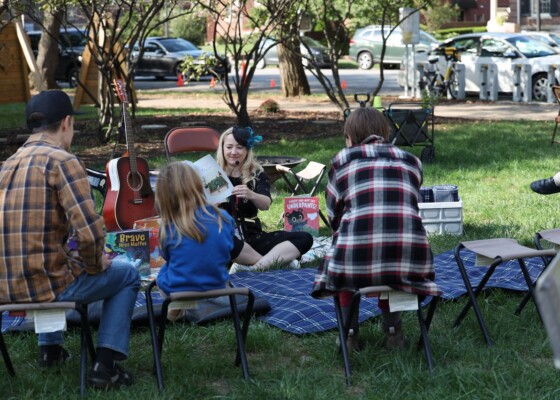Examining Ethics: Investigating Indiana’s History
August 3, 20162016 marks the 200th anniversary of Indiana’s statehood. Birthdays, even for states, are a time to reflect on the past and look forward to the future. A few months ago,…
2016 marks the 200th anniversary of Indiana’s statehood. Birthdays, even for states, are a time to reflect on the past and look forward to the future. A few months ago, our podcast, Examining Ethics, partnered with Indiana Humanities to create a three episode series related to some key moments in Indiana’s history.
Examining Ethics is hosted by the Janet Prindle Institute for Ethics at DePauw University. Our podcast focuses on ethics, and many episodes that we’ve done in the past have been about topics or issues that philosophers debate. We are very excited about this partnership, as it allows us to dig a little deeper into ethics issues brought to light by history, politics and economics. Not only that, we also get to explore the place in which we (the podcast team members) live and produce this podcast.
The first episode of the season, “Canal Crisis,” was released on June 29 (listen here!) and looks at Indiana’s decision in the 1830s to invest in a huge canal system that ended up bankrupting the state government. Over the past couple of months, we visited Delphi, Indiana, a town where a piece of this huge canal project still exists today. We interviewed former Governor Mitch Daniels and former Congressman Lee Hamilton, and we have had many other conversations with local historians and experts about the decision in the 1830s by Indiana’s government to make this huge investment in canals. In our conversations, we’ve talked about displacement of indigenous tribes, gentrification, taxation and the risk of governments making (or in some cases, not making) investments in big projects. We discovered just how influential an infrastructure project from the 19th century has been.
The second episode of the series, set to debut on Aug. 31, is about immigration and the state of Indiana. Compared to neighboring states, Indiana has taken in relatively fewer immigrants throughout its history. In this episode, we take a look at a few moments in Indiana’s history, particularly Japanese American resettlement after the Second World War, as well as more recent issues of immigration, such as the continuing debate about Syrian Refugee Resettlement and illegal immigration.
We will release the final episode of the series on Oct. 26. The episode focuses on incarceration in Indiana. One of our producers, Sandra, has volunteered at the Indiana Women’s Prison, which happens to be the first women’s prison opened in the United States. We’ll be talking about the ethics of incarceration and how we should treat prisoners, including the extent to which we should be educating prisoners while they’re incarcerated.
Everyone on our team – Hoosiers and non-Hoosiers alike – is thrilled about our partnership. Our producer Christiane was excited to read through old primary sources about how much people in Indiana disliked the methods available for travel in the 19th century. Sandra, our other producer, has thoroughly enjoyed meeting some amazing people, including Mitch Daniels and Lee Hamilton, local historians Dan McCain and Jim Madison, and professor of Museum Studies, History, and Africana Studies Modupe Labode. Overall, we’ve loved this opportunity to explore new topics and get to know our state a little better.
We hope you’ll tune in! Get all the details on the podcast series here.
———————————————————————————
This post was written by the Examining Ethics team at the Janet Prindle Institute for Ethics at DePauw University. For more information visit examiningethics.org or follow the team on Twitter.


